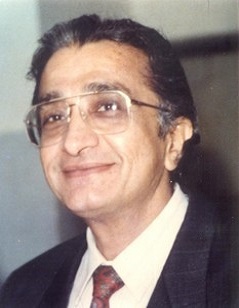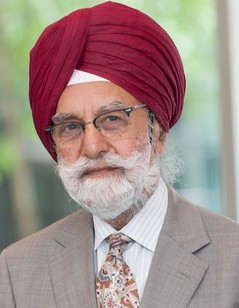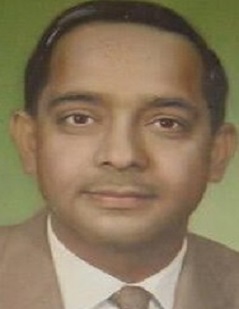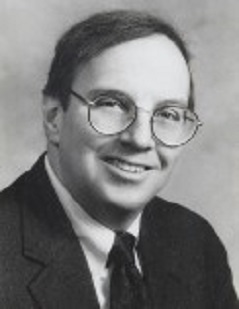My Journey
Journey of surgical oncologist and teacher of over 4 decades
INSPIRATION:
- I am little fortunate to be coming from a medical background as my father being a senior surgeon and professor. During my initial medical career, I watched him as surgeon with exemplary skills, honest approach towards his patients and the professionalism required to manage them. My father, Dr. H S D Sharma, was one of the top teachers in the country and was awarded by ASI for 2 consecutive years as a best teacher’s award.
- He passed on the surgical skills to his students with sincerity, passion and at times with hard hand on his students to be punctual in the efforts for work, for patient’s as they need humane touch in this profession. These qualities of him, I tried to imbibe to improve my standards to be a good surgeon and to be a good teacher.
- I also was fortunate and got an opportunity in my early adult days to go to the operating room to shoot videos of surgeries performed by my father with my 32 mm camera. I kept watching those supra major surgical procedures on my video, namely excision and reconstruction of aortic aneurysm., portacaval shunts and esophagectomies, were one or few out of multiple surgeries that he did. He encouraged me to become a surgeon. In this process, I by design chose a topic for my thesis of MS General Surgery on immunological assessment of cancer patients and surgical outcomes. This led me to Tata Memorial Hospital, to meet Dr. P. B. Desai (Ex-director and surgeon, TMH) who encouraged and guided me for my dissertation.
- After my postgraduation from Gandhi Medical College, Bhopal, I came to join Tata Memorial Hospital to become a surgeon. Those days, there was no formal degree course available for Onco Surgery, so Dr. Desai allowed me to join his unit in Tata Hospital in January of 1979 as a junior resident doctor. Those days, there were a handful of surgical residents available with loads of work to handle. All of us were there spent hours and hours in the ward and to learn about patient care in Oncology.
- In this profession of my journey as onco surgeon, I learned a lot from Dr. Desai, my teacher about surgical skills, clinical approach, instrument handling for better tissue handling, reaching a goal of excellent results.
- With all of my teachers, Dr. P.B. Desai, Dr. J. J. Vyas, I decided to become Onco Surgeon. During the process, I did lot of assisted surgeries and independent surgeries and tried to harness the skills of a good clean surgery.
- I realized that major surgeries need lots of special care in ICU, which were not available in those early days which led me to know more postop surgical care, handling of complications in complex cases. At that time, I used to sleep in the ICU sometimes to be close to the patients for acute exigencies and desired to have more facilities being added to ICU.
- Thus, came the need to have improved ICU care and facilities. Dr. N. S. Sawant, Chief Anaesthesiologist and Critical Care then facilitated to upgrade the ICU and we could learn the new methodologies of patient care postoperatively. He also made an effort to create good Anaesthesia and Critical Care Team at Tata Memorial Hospital in making the modern ICU, which has taken shape to one of the best now in India.
INSTRUMENT HANDLING AND SKILL SET IMPROVEMENT
- During my senior residency days, I had a lot of younger junior colleagues like Dr. Darius Dastur. I learned how to do modified colostomy, so that we could fit the colostomy bag properly and I still remember that paved a way of lot of ease of fixing the colostomy bag. Similarly, lot of other colleagues of mine, Dr. Madhu Maheshwari and many more, which I worked closely with had some of their excellent methods of handling or making fixations of drains, positioning of abdominal retractors to more steadily fix it, this helped me to pass on this knowledge to my younger colleagues. During my residency with all my co residents in other departments enjoyed working with them are top names in India few of them are my best friends namely Dr. Ramakant Deshpande, Dr. Ravi Deo, Dr. Gopinath.
- During end of my senior residency, I got a fellowship at MSKCC, New York to work in thoracic surgery and critical areas for about 1 year. There I had a pleasant fortune to watch in my opinion the best surgeons in the world Dr. Joe Fortner, most famous surgeon known for his radical regional pancreatectomy. I always made time to attend his surgeries, his observer and spent hours watching him. He had tremendous skills & techniques which I still use in my day-to-day cancer surgeries. The second man, under whom I worked in thoracic surgery is Dr. Manjit Bains, equally skill full and a crafty thoracic surgeon at MSKCC. I learnt esophagectomies, lobectomies and practically all major thoracic procedures from him. He taught me his personal techniques of instrument handling at surgery which I could imbibe in my surgical procedures with good results. I did learn finer nuances of radical three-filed esophagectomy at ISDE fellowship in Japan under Dr. Kakegava, Dr. H. Fujita, and by their techniques. With my small modifications I feel with all pride, I have got excellent results with negligible mortality in doing more than 1000 esophagectomies and have average 58% survival at 5 years and 93% survival of all nodes negative patients at 10 years.
IMPORTANCE OF ATTENDING CONFERENCES/ WORKSHOPS
- I made sure to attend different conferences and workshops in different parts of the world watching all top surgeons from France, Italy and many other countries which made me definitely a better surgeon, learning their skills, post-operative managements. This method of teaching for our residents was not available as media operative techniques were not known. I decided to host multiple International (three workshops on esophageal and lung cancer in 2005, 2008 2015) and National operative workshops in Mumbai and different parts of India started along with IASO and ASI. I also made efforts to go myself with many top surgical names to demonstrate video and operative procedures for those who had lack of these facilities at that time.
- Upon returned India in198, After joining back Tata Memorial Hospital and was appointed as surgical associate professor, I was fortunate to do all kinds of GI, thoracic surgeries and tried to teach all my junior associates at Tata Memorial few namely are doing excellent jobs now at different parts of our country namely Dr. Suraj Pawar (Kolhapur), Dr. Anil Heroor ( Mumbai), Dr. Mahesh Goyal (TMH, Mumbai), Dr. Virendra Rajpurohit (Jodhpur) and so many more in different parts of the India are doing excellent work, which gives me a proud moment to be a teacher of all of them.
- Seeing all methodologies of teaching, I can say that it comes in 2-3 parts i.e.
- Clinical teaching
- Surgical teaching
- post-operative management and showing their results and publishing their results
Clinical Teaching
- All surgeons have fond memories of their great clinical teachers and their memorable teaching moments However, if asked to quantify the objective measurements of teaching skills and qualities, these are generally incomprehensible. It may be possible to name some of the qualities of their great clinical teachers. And generally, the students when describing their teachers as "great “recall them as: consummate clinicians with mastery in their respective subject, proficient in communication skills, clinical diagnostic reasoning, learner- centred teaching, organizational and planning skills (arranging suitable patients) that foster a collaborative learning climate; open and reflective for feedback and have plenty of time and enthusiasm for demonstrating and themselves demonstrate physical signs and clinical skills during bedside teachings and procedures.
Residents and Teacher Assess the Efficacy of Teaching/Training Similarly
- Studies have addressed this important issue and most have found that in spite of common grounds, there is significant disagreement between residents and teaching faculty, especially in the operating room teaching which is fundamental to the development of a surgical resident. The reasons for this are not different to understand as both want and expect different things from each other: residents want greater teaching stress on steps like "instrument handling, suture selection, and "operative field exposure," while faculty felt residents are not properly prepared with basics like "surgical anatomy. "Natural history of disease," and "procedure choices. This taught me to understand the junior colleagues needs to be discussed with them in person to alley their doubts.
- The COVID pandemic has disrupted the conventional surgical teaching globally, but nimble footwork has ensured that great teachers have quickly risen to the challenge and adopted various virtual teaching models with great alacrity. Video conferencing, scheduled online classes/courses, webinars, e-simulations, and other remote teaching digital/e-models are being freely used with great felicity and have opened a new e-world for great teachers to share their wisdom even more easily with a wider audience across the globe.
Surgery based Practice and Research
- The past two decades, I have witnessed increasing use of evidence-based practice, research and translational research to implement efficacious treatment studies. Great surgical teachers inadvertently ingrain this practice of not using bogus treatments and emphasize the levels of evidence on which their decisions.
- "That the great surgical teachers shine like stars in the rolling pitch-darkness of night, instead of limiting the challenges they come across; they by their dexterity, deftness and featliness challenge their limits and transcend all the formalistic barriers and enrich the posterity with innovative ideas and styles.
- Nowadays, the improvement in the instrumentations, staplers, minimally access surgeries, newer approaches the skills set required has made surgical procedures much better, with decreased complication rates i.e., leakages, haemorrhages and with minimally access surgeries faster recovery, thus a surgical teacher has to be a master of newer technology which is now hallmark of good surgical teachers.
- The last thing, a teacher needs to be research oriented publications which were little less in our era due to multiple reasons which has changed since and also has to improve further and teachers should be more proactive to encourage juniors to publish their research work.
ACHIEVEMENTS
- My greatest achievement is that I could become an onco surgeon and in my eyes, I am reasonably satisfied; however, it is for people to judge my achievements for the societies.Other achievements are multiple awards by state governments of Chhattisgarh, Madhya Pradesh and multiple surgical and medical societies, namely ASI, API, ISO, ISMPO and state chapters of above associations in India and abroad for inviting me to deliver oration and keynote lectures.
- I have been facilitated by multiple bodies in India and abroad for promoting awareness of cancer and cancer prevention programs throughout the country.
- I have been also honoured by scientific bodies by giving me the positions of secretary and president to ISO & IASO. I can claim that I and few of my colleagues have brought multiple scattered scientific oncology bodies together and uniting them and bringing them to one platform now leading to ICC (Indian Cancer Congress) Program in India every 4 years. I feel privileged to have opportunity to be chairmen of 3rd ICC program to be hosted by Mumbai Group in 2023. This ICC program invites almost 8 to 10 thousand people of different spectrum from research, oncologist, nursing apart from surgical and medical groups.
CONCLUSION
- At last, I would say that after initial training at Tata Memorial Hospital and learning from great teachers and then to teach many in this country and abroad, I received enough satisfaction and pride in all junior associates and young surgeons who are doing exemplary job in this country which are peripheral to any part of the country and abroad to make the future for mankind filled with good treatment options.This reminds me of the quote ““Hippocrates”- Declare the past, diagnose the present, foretell the future, because, from past you weave the fabric for tomorrow.”

DR. P.B. DESAI.

DR. BAINS

DR. HSD SHARMA.

Dr. FORTNER.

Dr. Osugi & Dr. Udagaba with our team during ISDE workshop. (2015).